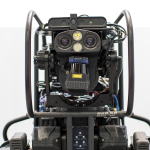Oxford £150m donation will fund ethical AI research

The University of Oxford has received a £150 million (US$ 190 million) donation for research into the ethical implications of artificial intelligence (AI), as part of a newly-built center for Humanities.
The funding represents the most significant private donation to the establishment since the Renaissance according to Architect’s Journal and endorses the renowned university as a world-leader for Humanities in the 21st century.
Named after its benefactor, the CEO, and chairman of alternative investment firm Blackstone, the Stephen A. Schwarzman Centre for the Humanities will explore the “crucial questions affecting the workplace and society.”
The University of Oxford’s Vice-Chancellor, Professor Louise Richardson said the new center would enable the university to demonstrate the “critical role the Humanities will play in helping human society navigate the technological changes of the 21st century.”
Former Director of the British Museum, Neil MacGregor, said the gift was “as timely as it is generous.”
Next generation of humanities
Building on Oxford’s leading and centuries-old reputation for the study of Humanities and Ethics, the ‘state-of-the-art’ facility will seek to attract the next generation of students, as a hub for interdisciplinary research for the modern age.
In a press announcement, Oxford said it regards the impact of AI as a fundamental question in the 21st century, adding that the technology will challenge the nature of what it means to be human and transform most aspects of our lives.
“From our health and wellbeing to the future of work and manufacturing, AI will redefine the way we live, work, and interact.”
Like the development of medical ethics 30 years ago, Humanities will be crucial in providing an ethical framework for developing machine intelligence and responding to increasing workplace automation and use of algorithms in various forms. Accenture has predicted that AI could enable industries to increase profitability by approximately 38 percent by 2035, and could double economic growth rates in 12 economies.
The AI ethics debate
With current AI technology prone to forming bias— often because of misrepresentative data sources, or by mimicking observed human behavior— ethics have become an important consideration for the technology as it rapidly gains steam.
The technology’s role in modern warfare is a pressing matter. Last year, for example, Microsoft said it would be engaged on debates surrounding “autonomous weapons,” it wouldn’t shy away from providing the US military with its “best technology”.
Last week, meanwhile, a deepfake video of Mark Zuckerberg posted on Instagram highlighted the critical role AI could play in the dissemination of false information and current lack of policies, regulation or technology to combat the imminent threat.
YOU MIGHT LIKE

IT pros think AI regulation is the way forward
Plenty of initiatives are emerging to tackle the subject of AI ethics, but the topic remains complex and contentious, requiring substantial further research and debate.
Earlier this year, Google was pressured into folding its AI ethics council just one week after launching, having faced protests from employees after appointing to the panel a rightwing thinktank leader.
Commenting on the investment, author and Oxford alumnus, Sir Philip Pullman, said he welcomed the new enterprise “warmly”, and expected it to become a widely recognized new facet of the university.
“This is a time when technology is making new media, new forms of communication, new ways of thinking available to a much wider range of students and citizens than ever before, but also when the roots of humane study need nourishing and strengthening – and indeed protecting – in a world that sometimes seems to have lost touch with the best elements of its past.









